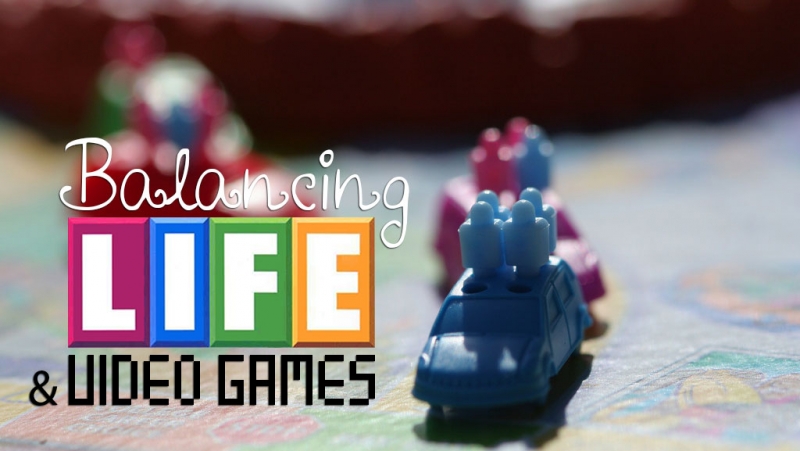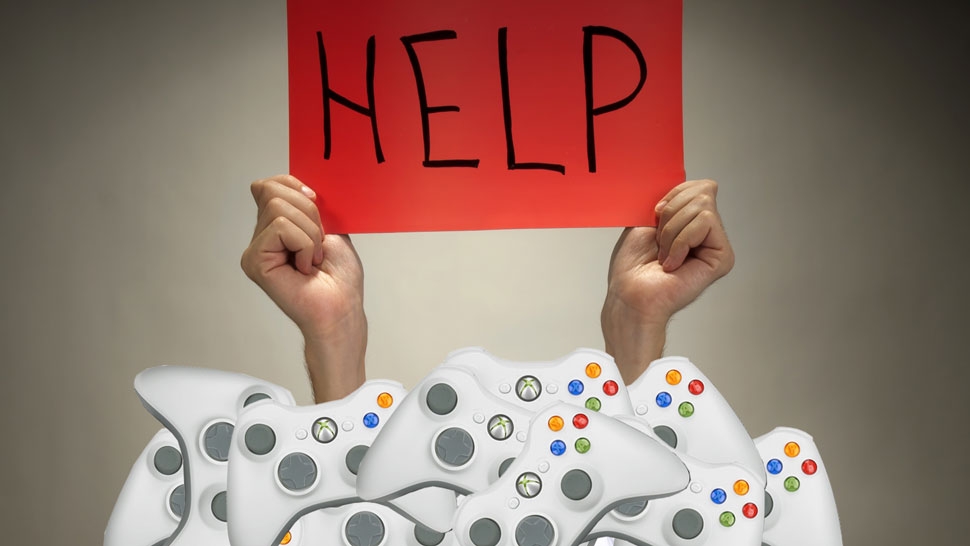
One of the saddest things I hear is, "Well I used to play a lot of games but I just don't have time for them anymore." In the list of priorities, video games didn't make the cut. Sure, you may still watch a bunch of television shows and go to concerts all the time, but video games? Video games could be kicked to the curb.
I keep trying to tell my oldest brother that, yes, even though you're busy launching your new company and, yes, even though you just got a brand new puppy, there's still time in your life for video games. Please make time for video games.

I pick out titles I know he'll love---the last game I got him to play was Saints Row: The Third---but even then he'll rampage around a city for a while before letting his devotion to the game taper off.
I maintain that it's possible to squeeze a bit of (healthy) video-game time into a well-rounded adult lifestyle. If you can sit down to read a book for a few hours on a lazy Sunday, surely you can spare time for games. After all, video games are worth the time investment. For so many reasons. They're therapeutic. They're educational. They're plain ol' fun.
In an attempt to convince more people to at least try to make gaming more a part of their life, here are some tips for time management that will help them do so.
1. Limit Your Consumption; Avoid The Really Time-Consuming Games
This ain't college anymore. We don't have the luxury of spending a weekend shut in our dorm rooms playing rounds of GoldenEye and Halo with roommates and floormates and friends and, wait, is that my English professor? It's more important than ever to prioritize which games we play.
Personally, I've gone so far as to cut entire games out of the picture. I used to play a lot of World of Warcraft. I used to be in a guild. Socializing for me meant hopping in to chat with guildmates and playing with friends online. It got to the point where I'd even multitask, raiding some dungeon while watching something else on TV.
But nowadays, it's important to not let an entire day go to waste, so I don't play never-ending MMOs anymore. There are still games I will play from morning until night, though (and not just when I'm reviewing them). I enjoy games enough to still feel productive when spending the day burning through a lengthy game like Ni no Kuni. It's probably somewhat different for me than it will be for you, since playing games is also a part of my job. But that's not the case for everyone. If you have a family and other responsibilities, you might not want your entire day dedicated to a game. You might feel guilty for neglecting laundry duties and procrastinating building that bike for your kid. And everything else parents do.
I spoke with one parent, Shawn---who balances being an avid gamer with his role as both a husband and new father---to gauge how he manages his time. He shared a similar feeling towards MMOs:
"Social MMO's are pretty much impossible for me. My gaming schedule is too unpredictable and irregular, I cannot make any commitments to any guild/corp/outfit buddies. And I certainly don't have the time to spend plowing through the grind that most MMO's require in order to obtain experience/gear/currency/etc. I spent a couple years pretty involved in EvE Online back around 2006-2007, but keeping up with that game would be impossible for me now."

I've noticed similar difficulties as an FPS player. Those games are dangerous for me, because what starts off as, "Oh I'll just play a few rounds," turns into, "God dammit that bastard has it coming. I'm targeting XXsnipedyomamaXX next game." I tend to have an addictive, one-more-round-please, attitude when it comes to first-person shooters. I'll still hop on when I need some stress-relief or when I'm looking for a game to play with a friend some weekend, but I try to limit how often I return to them. Because I just know I'll lay an entire day to waste, rubbing my bloodshot eyes at 4am trying to remember if I even ate anything all day.
I might decide to skip on an RPG if it's the kind that will ask me to aimlessly grind before I'm powerful enough to progress. You know the ones. I'm still pushing through Etrian Odyssey IV even though I'm at a point where I'm all but required to grind. It's a handheld game so I give it a pass. I can play it on the train or during a road trip or while waiting for a friend. It's easier to integrate a mobile game into the tiny crevices of free time that I'd otherwise spend on my phone reading Kotaku or Twitter.
Limiting your daily game-time can be as strict as keeping to 30-minute intervals. Speaking with friend-of-Kirk and father of a 6-month-old, Dan, he told me that it can be difficult to limit yourself to such short bursts, but it's a necessity. "Having responsibilities means developing a relationship with the pause button," he elaborated to me. "Games without a 'Save and Quit' option are the enemy."
"Having responsibilities means developing a relationship with the pause button."
Picking a less time-consuming game can also mean picking a game with natural pauses that make it appropriate to constantly start and stop as needed, especially for the 30-minute interval rule. Dan reminded me of one fitting title: "I polished off nearly all of Super Meat Boy in the first few months after our daughter was born, in large part because the start/stop pacing of the game fit so well into my nightly childcare routine."
Another married friend I spoke with, Doug (who also keeps busy with a job that requires a ton of hours and travel), echoed a similar sentiment: "Weekends and late nights are all I've got --- and some nights I know I can't play for more than 30 minutes, so I make sure it's something that doesn't get too involved --- indie games, platformers.. stuff that I can put in some time, save it, and I don't have to remember anything about where I was when I come back."
Shawn landed on a similar point about the troubles of remembering storylines in lengthier games. He told me that they typically need to be spaced out over what ends up becoming a couple of months worth of tiny intervals of gaming at a time. It's why he has yet to play L.A. Noire even as it sits unplayed in his Steam library. He opts for Minecraft:
"Minecraft has been an absolute godsend in this regard. I can jump onto a server and fart around building something random or digging holes or whatever for 10 minutes and then leave, or if I know I'm going to have an hour to play, I can build something more involved. There's no real goal, the rules are pretty simple and don't really ever change, and there aren't really any important skills that I have to worry about forgetting if I don't get to play for a while. MC is pretty interesting in that it can consume an almost endless amount of time if you let it, but it also works pretty well in short and sporadic sessions."
The game you choose to play can be specific to your needs and your play style, but the point remains the same: finding a game that doesn't will you to completely zone out for hours is key.
2. Skip The Extra Stuff; Just Plow Through
It can be hard to let go of an entire genre like RPGs just because they take out huge chunks of time to complete. If you rather find a way around that harsh decision, skipping side quests and hidden items could be wise, especially if you intend to finish one of these games.
Dan uses a similar tactic, denying his inner completionist the satisfaction of turning over every stone: "Spending less time exploring corners of the map (or, better yet, opting out of tedious inventory/character management) means more time for gameplay."
Father of one adorable little girl (and a personal friend), Randy, notes that trophies and achievements can get in the way of finishing games, too. "Some are set up specifically to pad gameplay or take you out of your way from completing the game on a more natural playthrough."
3. Keep Your Priorities Straight
If your baby is screaming wildly in need of a diaper change, this is not the time to try that new DLC that just came out for your favorite game. Go change poopy butt over there first.
If you promised your spouse you'd make them a romantic dinner that evening, go pick up the groceries for it first.
If you have a 9am deadline on that TPS report, make sure to get it done first so you can play with ease afterwards.
"If my wife needs me to put down the controller to go help her with something, doing so is the proper response."
Speaking with Shawn, he explained that this is the most important part of his balancing act. While his wife is understanding of his need to fit gaming into his life, he has to reciprocate. In an email with me recently Shawn explained: "That obviously has to be balanced by an understanding on my part that the games are just games, they are not a priority, and I accept that at anytime when I'm playing, if my wife needs me to put down the controller to go help her with something, doing so is the proper response."
If you prioritize and cross your chores off your list first, you won't feel any guilt about playing games afterward. If you miss deadlines or anger your husband/wife, you might begin to think that video games are getting in the way of your happiness. They're not! You just need to prioritize.

4. Diversify Your Media Intake; Make A Trade
If you've been going to a lot of shows recently, or are really caught up in a comic series, try switching things up and replacing that current hobby with a video game you've been meaning to try out. You're not taking time away from any of your responsibilities, just trading one pleasurable hobby for another. Plus, it'll keep the experience of reading that comic or meeting up with your music aficionado friends (or whatever else) fresh and less monotonous. Everyone wins.
5. Be Selective; Keep Your Library Tight
I like to keep all my games. I like libraries of things in general. It feels like a good show of my interests, memories, tastes. But it can feel daunting to look at a shelf and realize you haven't played more than half the games there. Maybe even to see one or two still in their shrink-wrap. But hey, you're an adult now. You don't have time to play every game that comes out.
Talk to friends, read some of your favorite gaming websites (ahem), and gauge what games you feel like you just have to play. My mom gives me similar advice when we go clothing-shopping. If you're hesitating, she tells me, you know you're never going to end up wearing it. She's so right. The same goes for games. If you're not really excited about a game you pick up, you'll probably toss it aside in favor of some old favorite, or whatever other new game comes along. So you might as well be selective about what games you do pick up.
6. Play On Easy Difficulty
This one was a really difficult transition for me. I still typically opt to play on at least a Normal difficulty level, but occasionally---if I know a game is a particularly long one---I'll hover over the Easy option for an unreasonable amount of time before finally deciding to try it out. I still get to experience the game but it doesn't take as much time, and hey, I might even like the game more for it.
7. Try Methods Of Integrating Games Into Other Parts Of Your Life
It can be hard to manage home-life with game-life when you have children. I chatted with both Evan Narcisse and Mike Fahey---resident Kotaku daddies---about how they manage their time. Evan jokingly suggested staying up late, but you may not want to sacrifice delicious, delicious sleep. Although Dan had a similar suggestion, noting that while a big chunk of the day is devoted to family time, he'll budget time throughout the workweek to fit some gaming in accordingly. That sometimes results in early mornings for him or, more often, late nights. How that plays out week to week will likely depend on your personal schedule.
Dan also explained that making a multiplayer date with your significant other is a reasonable way to both find time to game as well as spend time with your spouse. "Pitching multiplayer sessions to your significant other as a 'night out' really helps carve out a dedicated block of time for gaming (as long as you're open to giving your partner a night off in return!)," he told me in an email.
"Pitching multiplayer sessions to your significant other as a 'night out' really helps carve out a dedicated block of time for gaming."
Fahey had an interesting and similar idea, too: get used to playing games that your children can grow up to enjoy. That way, when you want to sit down to play Skylanders, you'll be hitting two birds with one stone. Just like that, you're playing games and bonding with your kid.
This works for those of us who don't have children, too. I brought up playing handheld games earlier in this article. If you're on the train with not much else to do, whipping out a 3DS or Vita or what have you is a good way to get in game-time without it getting in the way of your daily schedule.
Doug noted to me that some games can even fit with specific activities, like exercising. "I did just pick up an interesting game on my phone --- Zombies, Run --- that fits gaming into my regular exercise schedule," he told me. "It's an app that plays your music and puts in dialogue to make it sound like zombies are chasing you every now and then.. you pick up weapons and food and stuff along the way to upgrade your town.. it's got the right aspects of gaming.. rewards and accomplishments --- and it's entertaining. So finding ways to game and do something else at the same time helps to get a gaming fix in."
There are plenty of ways to fit gaming into your regular routines.
These are just a few tips that have come to mind. Many of them are guidelines I've adapted to as my free time slowly closes in around me. Others came with the help of some crowdsourcing from parents and otherwise busy gamers who have even tougher struggles with the limits of time. If you've got other tips, chime in below.
